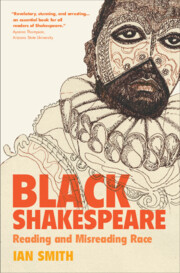‘Ian Smith’s Black Shakespeare begins by asserting that lingering contemporary resistance to the evidence that people in the early modern world believed that race was real and that it mattered participates in a larger denial of the kinds of work that race performs in our own time. In a series of subtle and revelatory readings-I am thinking particularly of the dazzling chapter on Hamlet-Smith implicitly argues that learning to recognize race’s subtle and extensive operations in Shakespeare can be an important first step toward our own achievement of what he calls ‘racial literacy’. To see and to know, Smith believes, is to begin to be able to recognize and resist white supremacy’s purchase in our field and in the culture that shapes it. Persuasively argued and deeply ethically engaged throughout, Black Shakespeare is the work of a mature scholar who believes that Shakespeare matters and who calls on us both to embrace and to question the conditions under which he has achieved his place in our world.’
Joyce MacDonald - University of Kentucky
‘Ian Smith delivers an indisputable, learned and earth- shattering intervention into our habits and practices of reading the works of William Shakespeare. If, Smith is right that Shakespeare's plays are read, taught and interpreted on stage overwhelmingly through the lens of whiteness, then racial illiteracy informs our relationship with the Bard. To read Shakespeare rigorously, thoroughly and with intention, is to acknowledge what Smith calls our 'racial blindspots'. Smith's novel readings of Shakespeare's tragedies are unflinching as he asks us to confront what is actually before our eyes. Black Shakespeare is essential reading for all those studying, teaching and performing these works.’
Farah Karim Cooper - Shakespeare's Globe and King's College London
‘In Black Shakespeare, Ian Smith trenchantly demonstrates how white epistemology and systemic whiteness cause readers to sanitize, distort, and elide key parts of Shakespeare’s texts. Theoretically and historically grounded, Black Shakespeare also deploys dazzling acts of close reading to show exactly what a white reading practice misses or gets wrong. Throughout, Smith makes the stakes of his argument clear: readers must acquire an expanded racial literacy both to read Shakespeare well and also to become citizens fit for the demands of a democratic polity.’
Jean E. Howard - Columbia University
‘Black Shakespeare is an important and timely study of how race affects reading and interpretation. Smith not only illuminates various functions of whiteness within Shakespeare’s plays, but also demonstrates that whiteness has shaped the idea of Shakespeare in Shakespeare Studies. Beyond the brilliant insights that it offers about Shakespeare, Black Shakespeare requires literary scholars to reckon with how white supremacy is perpetuated through interpretive practices.’
Dennis Britton - The University of British Columbia
‘Black Shakespeare is revelatory, stunning, and arresting! Crafting a disorienting tour de force, Ian Smith has written an essential book for all readers of Shakespeare that demonstrates not only how we have misread the plays, but also how we might rectify readings in the future. A requisite read!’
Ayanna Thompson - Arizona State University
‘In an argument that is both elegant and forceful, Smith makes the obvious but heretofore underappreciated point that the act of ‘reading historically’ is itself saturated with a racial history that must be a subject of analysis. For putting this argument on the table, and for its convincing reappraisal of some of Shakespeare’s best-known plays, Smith’s study is destined to be a landmark in a field that continues to pose powerful, searching questions in the humanities.’
Michael Witmore - Folger Shakespeare Library
‘With his latest monograph, Smith captures the attention of his audience on the very first page … and he never lets that audience go. This book makes a seismic contribution - nay, offers a paradigm shift - to Shakespeare studies. … ‘Black Shakespeare’ is an extraordinarily clarifying work and should be taken up not just by scholars of Shakespeare but by theater practitioners as well. … Essential.’
A. P. Pennino
Source: Choice
‘… essential reading not only for early modern scholars, teachers, and students who seek to 'contemplate the intersection of literary studies and an antiracist politics and future' (149), but more importantly, for those who do not.’
Carol Mejia LaPerle
Source: Modern Philology
‘Smith writes eloquently and passionately about racial marginalization and inequality more generally, demonstrating how social and political issues intimately fuel their criticism around a paradigmatic writer such as Shakespeare.’
Goran Stanivukovic
Source: ariel: A Review of International English Literature



